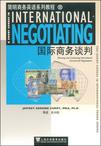国际商务谈判
出版时间:2009-1 出版社:上海外语教育出版社 作者:卡瑞(Curry,J.E) 著;史兴松 导读 页数:182 字数:352000
Tag标签:无
前言
截至2008年,教育部已批准对外经济贸易大学、广东外语外贸大学和上海对外贸易学院三所高校设立商务英语本科专业。目前,全国已有近700所院校开设了商务英语专业方向或课程,商务英语教学内容由语言能力、跨文化交际、商科知识、人文素养四个课程群组成,如何建设和完善商务英语教材已成为办好商务英语专业的关键因素之一。 上海外语教育出版社经过精心策划,适时推出了商务英语知识群的教材——“简明商务英语系列教程”。这套原版商务英语专业知识阅读教材从美国世界贸易图书出版社最新引进,共12本,涉及商科知识的各个领域,包括国际经济学、国际贸易、管理学、营销学、国际商法、商务谈判、商业伦理、商业文化、商业合同、商业支付等。本系列教材的特点是:知识体系完整,内容简明扼要,语言文字流畅,理论联系实际。为了帮助读者更好地理解商务英语学习所必备的商务专业知识,本套教材组织了阵容强大的专家委员会,还特邀对外经济贸易大学商务英语的专家教授为本系列教材撰写导读,相信一定会对学习者大有裨益。 本系列教材可以作为大专院校商务英语、国际贸易、工商管理等专业学生的相关课程的教材,同时也可作为企业各类管理人员的培训教材或辅导资料,以及广大商务英语学习者的自学教程或阅读丛书。
内容概要
本书旨在传授国际商务谈判的基础知识,介绍商人在谈判中制胜的策略和技巧,实用性很强。基于自身丰富的实践经验,作者不仅阐述了在国际商务实践中进行商务谈判的实用技能,还非常注重启发和强化跨文化商务交际的意识和知识。课本的内容简明、系统,具有较高的可读性和启发性。可作为大专院校国际贸易、商务英语、商务管理等专业国际商务谈判课程的教材,同时也可作为商务人员从事国际商务谈判的参考书。
作者简介
卡瑞(Jeffrey Curry)曾获得工商管理硕士和博士学位,是一名知名的国际贸易专家,多年来在亚洲、北美和欧洲从事大型的国际贸易业务和合资企业的谈判活动。他在亚洲和北美教授过管理学、经济学和国际金融等课程。他是《越南通行证》(Passport Vietnam)等书的作者,也是《观
书籍目录
Chapter 1: THE ROLE OF THE CHIEF NEGOTIATOR Small Stage, Big PartChapter 2: CHOOSING YOUR TEAM Big Guns, Little GunsChapter 3: CONTROLLING NEGOTIATIONS Who's Calling the Shots?Chapter 4: INITIATING NEGOTIATIONS Getting the Lay of the LandChapter 5: FACE-TO-FACE Sizing Up Your CounterpartsChapter 6: THE FUNCTION OF BIAS Perception versus RealityChapter 7: SITE SELECTION How Do You Get There, from Here?Chapter 8: THE AGENDA Carve It in StoneChapter 9: ABOUT TRANSLATORS Making Sure Your Message Gets ThroughChapter 10: NEGOTIATING STYLES, PART 1 Major Personal StylesChapter 11: NEGOTIATING STYLES, PART 2 Major Team StylesChapter 12: PLANNING TO WIN Success Is a Choice, Not a ResultChapter 13: COUNTERING PERSONAL STRATEGIES How to Get the Upper HandChapter 14: COUNTERING TEAM STRATEGIES How to Keep the Upper HandChapter 15: SELECTING TACTICS Playing to WinChapter 16: CLOSING THE DEAL Who Makes the Decision?Chapter 17: REPORTING RESULTS Is 99 Percent Enough?Chapter 18: COMMITMENT The Strain of ImplementationChapter 19: STRATEGIC AND TACTICAL GUIDELINES BY COUNTRYChapter 20: GLOSSARYChapter 21: RESOURCES
章节摘录
LOCATION Location, or the sudden change of location, can be used to disconcert an opponent-even more so when theyre "high maintenance" types who require ideal circumstances for optimal performance. Targeted visitors may find that the meeting facility that was touted as being "just outside of the city" is in reality a two-hour drive through backroads. Unfamiliar territory and distance from their psychological link to getting home (the airport) make the victim of this tactic dependent on their opposition. No longer merely counterparts, they have become caregivers. Add into this the accompanying language problems, transport restrictions, and general separation anxiety (homesickness), and the picture is complete. Negotiations will proceed but under the control of the practitioner. Its a tactic thats best used against inexperienced negotiators, as it relies on the target being unused to the rigors of travel. Experienced teams will be only mildly inconvenienced and yawn at the ham-handedness of the ploy. Another location tactic is commonly used by large companies to awe counterparts. Rather than inconveniencing opponents, they lavish them with every possible thing they could want. Meeting facilities and hotels are top-of-the-line with furnishings designed to impress. Tours are arranged for cuttingedge manufacturing plants and high-tech compounds. No expense is spared. The message being sent out by the practitioner is "were already at the top. We dont need your (product, business, expertise), but we are more than happy to discuss it." If youre on the receiving end of this tactic, be aware that the underlying message is "We really want what you have but were going to try and convince you that its not worth very much." This tactic never works on Impassive or Stern strategists but the rest of us are highly susceptible to it. Remember, though the lap of luxury is nice, youre still sitting on someones lap. INDEBTEDNESS This gambit entails making counterparts feel as if theyre in your debt on several possible levels. The first involves financial debt and is actually best used by a negotiator who doesnt appear to be flush with cash. Unlike the rich Location practitioner above, whose main goal is to make you feel as if their expenditures on negotiations are everyday costs, the Indebtedness tactician subtly lets it be known that every pfennig, rupiah, or peseta they spend on counterparts is a major exception. Food, lodging, drivers, translators, sometimes even airfares are paid for by the practitioner as an investment in the ultimate outcome of the negotiations.
编辑推荐
《简明商务英语系列教程10:国际商务谈判》可作为大专院校商务英语、国际贸易、工商管理等专业学生的相关课程的教材,也可作为企业各类管理人员的培训教材或辅导资料,以及广大商务英语学习者的自学教程或阅读丛书。
图书封面
图书标签Tags
无
评论、评分、阅读与下载
用户评论 (总计17条)
- 喜欢商务英语的朋友 可以买来看看比较好的一本书
- 十分经典,无论学术实践均有参考价值。
- 非常实用的书,很适合初学者。书的质感还不错,物流也很快。
- 我们学校也开这门课,相比而言,这本书要好些,这是一本不错的书~~
- 之前忘记评价了,书很好,是我想要的,赞一个!
- 书不错,挺有质感
- 听朋友推荐后买的,貌似很好的一本书
- 很不错,觉得质量挺好的 下次还来买
- 送货很及时,商品完好无损。当当网太棒了。呵呵:)
- 有些难度啊,要多读读
- 实在看不进去,浪费作者一番苦心
- 要参加上外的复试,这套书非常有帮助,虽然全英文,但是写的很好,很全面
- 书不错,就是排版和纸质有点没有预期的好~~~
- business negotiation is good
- 看的话,要准备足够的耐心。买了之后,没有怎么看。
- This book is very very very good. It is very useful for the guys who would ***e to study international business.
- 书有点贵,纸质却很一般
推荐图书
- 标志设计
- 世界民歌钢琴公式化即兴伴奏
- 刑法的辩护与批判
- 玉龙情殇
- 滇西边区考察记
- 经典素描技法
- 世界共产党现状及发展趋势
- 石油化工厂设备检查指南
- 有机化学实验
- 佛教汉语训释方法探索
- 中级经济法
- 会计业务巧学活用
- 民族弹拨乐队合奏曲集3
- 课程改革与教师教学能力发展研究
- 高等教育发展代价论
- 中国大陆学生教师实习期间教师知识发展的个案研究
- 英国高校创业教育研究
- 中国国有企业治理制度研究
- 油气地面工程 科技成果专辑
- 石油工程HSE风险管理
- 生理-心理健康教育
- 独立董事功能与上市公司治理
- 毛泽东管理思想与管理方法
- 1958-2008-中国石油勘探开发研究院五十年理论技术文集(全二册)
- 中国石油勘探开发研究院五十年
